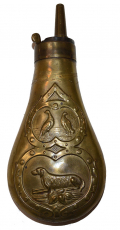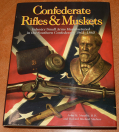site search
online catalog
Firearms
Showing 81 to 100 out of 272
DISPLAY OF CIVIL WAR UNION AND CONFEDERATE CARBINE AMMUNITION
Offered here is a fine display of fifteen bullets, one complete cartridge, and a cartridge case used in the Civil War, Union and Confederate, all labeled and properly displayed in a matted Riker… (2024-1923). Learn More »
$175.00
SOLD
VERY GOOD, NEAR FINE IVORY GRIP GUSTAVE YOUNG STYLE ENGRAVED COLT M1851 NAVY MADE IN 1859
This very pretty Colt Navy is serial number 92278, giving it a manufacture date of 1859, and is an early 4th Model, with no capping groove and larger triggerguard. The serial numbers match throughout… (1179-674). Learn More »
$7,500.00
ON HOLD
DOG AND PHEASANT MOTIF SLOPING CHARGER POWDER FLASK FOR REMINGTON REVOLVERS
This pattern of flask is associated with cased Remington Army and Navy revolvers. The embossed motifs feature a pair of standing pheasants at top, who seem to have met their fate in bottom panel,… (490-6975). Learn More »
INDIAN WARS SHARPS CARBINE METALLIC CARTRIDGE CONVERSION
Starting in 1867 the government started upgrading rifles and carbines to take metallic cartridges. This included some 31,098 Sharps carbines, New Model 1859, 1863 and 1865 patterns, which were taken… (172-6027). Learn More »
VERY RARE US MODEL 1830 WEST POINT CADET MUSKET, 36-INCH BARREL: ONE OF JUST ONE HUNDRED AND FIFTY-FOUR MADE FOR WEST POINT
The Model 1830 cadet musket was the first musket designed and fabricated specifically for cadets at the US Military Academy, the cadet corps until that time having used the M1817 Artillery Musket,… (490-3492). Learn More »
CONNECTICUT ARMS AND MANUFACTURING CO. HAMMOND .44 RIMFIRE “BULLDOG” PISTOL, CA. 1865-1868
This is a strong example of the standard production with 4-inch barrel, gutta-percha (thermoplastic) checkered grips, chambered for the .44 rimfire cartridge. These pistols were elegantly styled by… (490-7040). Learn More »
VERY SCARCE US GOVERNMENT PURCHASE MERRILL RIFLE
This Merrill breechloading rifle is one of just 566 contracted for by the US government in December 1861 and delivered from August through December 1862, inspected and marked by Zadock Butt, and known… (490-7012). Learn More »
.58 CALIBER RIFLE MUSKET CARTRIDGE
Regulation tan paper cartridge for the U.S. .58 caliber rifled musket. This is the typical "minie ball" cartridge of the American Civil War. Known as the "regulation" or "American military" style of… (2024-2131). Learn More »
SCARCE ALLEN AND WHEELOCK CENTER-HAMMER LIPFIRE .36 CALIBER NAVY REVOLVER
Ethan Allen, with his various partners, was a significant figure in the history of American firearms manufacture though overshadowed in popular (well, at least collector) memory by Colt, Remington,… (490-6720). Learn More »
NICE, COMPLETE EARLY-MID 18TH CENTURY FRENCH MUSKET LOCK
This pattern of lock and its construction typifies those found on French muskets or fusils prior to the advent of the famed m1777 “Charleville” musket. This is most likely a 1728 - 1766 pattern… (766-2040). Learn More »
USED HANDSEWN CONFEDERATE WARTIME MANUFACTURE HOLSTER
This holster features hallmarks of Confederate wartime manufacture, including a press brass button closure, hand stitched seams, hand stitched closure flap, and hand stitched belt loop attachment. The… (1202-190). Learn More »
US MODEL 1842 RAMROD SPRING BAR
Good clean condition. [ad] [ph:L] ~~~~~~~~~~~~~~~~~~~~~~~~~~~~~~~~~~~ THIS ITEM, AS WITH ALL OTHER ITEMS AVAILABLE ON OUR WEB SITE, MAY BE PURCHASED THROUGH OUR LAYAWAY PROGRAM. CLICK HERE FOR OUR… (689-88). Learn More »
$75.00
Originally $100.00
FLINTLOCK MUSKET VENT PICK AND BRUSH SET
This was an essential military gun tool during the flintlock era: a wire pick for clearing the vent hole of the musket and small horsehair brush for cleaning out the priming pan. Overall length is… (2024-1346). Learn More »
SCARCE CONFEDERATE USED, C.S. ORDNANCE “CLEANED AND REPAIRED” FOURTH MODEL BURNSIDE CARBINE
This Burnside carbine shows it saw some heavy service and on the bottom of the stock bears a “Q” final inspection stamp of the Confederate Cleaning and Recovery (“C&R”) service. The… (490-7048). Learn More »
1ST EDITION COPY OF “CONFEDERATE RIFLES & MUSKETS” BY MURPHY & MADAUS FROM THE LIBRARY OF THE LATE DEAN S. THOMAS
Very fine condition copy of “CONFEDERATE RIFLES & MUSKETS: INFANTRY SMALL ARMS MANUFACTURED IN THE SOUTHERN CONFEDERACY 1861-1865” by John M. Murphy and Howard Michael Madaus published in… (2022-1304). Learn More »
CONNECTICUT ARMS AND MANUFACTURING CO. HAMMOND .44 RIMFIRE “BULLDOG” DERINGER, CA. 1865-1868
This is the standard configuration for the Connecticut Arms Hammond “Bulldog” pistol, a single-shot .44 cal. Deringer with 4-inch barrel, that would have proved a persuasive at short range. This… (490-7036). Learn More »
CONNECTICUT ARMS AND MANUFACTURING CO. HAMMOND .44 RIMFIRE “BULLDOG” DERINGER, CA. 1865-1868
This attractive, single-shot Deringer rates very good or near fine for condition with smooth metal, all original parts, sharp lettering, nice grips and near 30 percent or so original finish showing as… (490-6876). Learn More »
“EXTREMELY RARE” SILVERED BRASS FRAME ALLEN AND WHEELOCK DROP-BREECH RIMFIRE RIFLE
Also known as the Allen Drop Breech, these breech-loading rimfire rifles were produced in limited numbers at Worcester, MA, from 1860 to 1871. Flayderman estimates them at 1,500 to 2,000 all told, but… (172-6030). Learn More »
WHITNEY “PLYMOUTH” 1861 PERCUSSION NAVY RIFLE
Produced at the Whitney Armory near New Haven, Connecticut early in the Civil War, this original long arm is often referred to as either the Plymouth rifle, the Whitneyville rifle or the Dahlgren… (2024-1698). Learn More »
$1,650.00
ON HOLD
CIVIL WAR SPENCER M1860 CAVALRY CARBINE
This is a good, representative Spencer carbine, likely brought home by a veteran, sporterized slightly for use around the farm or taken west in the early years after the war. The carbine is the… (172-6026). Learn More »
Showing 81 to 100 out of 272
Most Popular
Historical Firearms Stolen From The National Civil War Museum In Harrisburg, Pa »
Theft From Gravesite Of Gen. John Reynolds »
Selection Of Unframed Prints By Don Troiani »
Fine Condition Brass Infantry Bugle Insignia »
British Imported, Confederate Used Bayonet »
Scarce New Model 1865 Sharps Still In Percussion Near Factory New »
featured item
EXCELLENT LARGE, ORIGINAL FRAMED OIL PAINTING OF 20TH MAINE’S JOSHUA LAWRENCE CHAMBERLAIN BY MICHAEL GNATEK
This is an original oil on canvas portrait of Major General Joshua L. Chamberlain of the 20th Maine Infantry done by the late Michael Gnatek. Mr. Gnatek received his art training at Yale University and in the Marine Corps, where he was a combat… (10-1968). Learn More »
site search
Upcoming Events
May 16 - 18: N-SSA Spring Nationals, Fort Shenandoah, Winchester, VA Learn More »






















